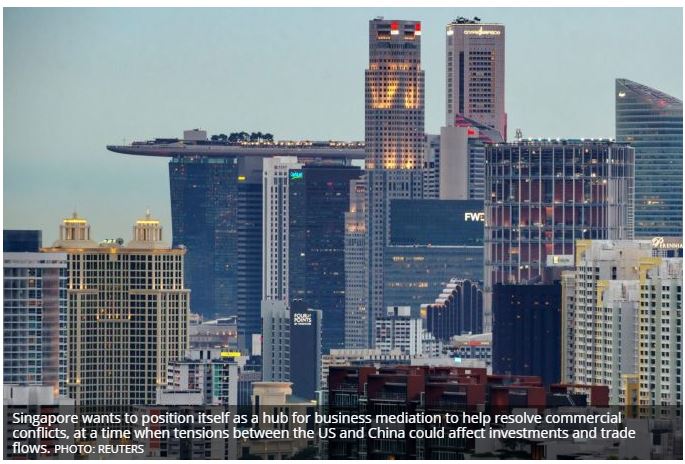Singapore pushes for mediation role as trade war breeds disputes
[SINGAPORE] Singapore wants to position itself as a hub for business mediation to help resolve commercial conflicts, at a time when tensions between the US and China could affect investments and trade flows.
The city-state is looking to build on its reputation as a top arbitration destination in Asia as it prepares to sign the Singapore Convention on Mediation which comes under the auspices of the United Nations. More than 10 countries are expected to sign at a ceremony in Singapore on Aug 7, after which they’ll ratify it in their national parliaments, Law Minister K. Shanmugam said in an interview this week.
“Dispute resolution is critical for anybody who is investing cross border,” Mr Shanmugam said. “The dispute between US and China is bad for overall business, but in the short term, that may result in more people having to resort to dispute resolution.”
The Trump administration’s tariff threats – which have caught Europe, Japan and India, among others, in its crosshairs – is contributing to a slowdown in global growth, potentially hurting trade-reliant Singapore. Despite a restart in US-China talks, the city-state is concerned the two largest economies have fundamental disagreements that will put ongoing pressure on business and consumer confidence.
“I expect a lot of people in Asia to choose Singapore as a place where they automatically will come and mediate,” Mr Shanmugam said. “Our courts have a very strong reputation, our judicial system, our rule of law, all of this are well known.”
Mediation, where there’s a neutral party sitting down with both sides to figure out a solution, can be an alternative to litigation or arbitration, if companies aren’t able to carry on with their investments or continue with businesses due to the tariff situation, he said. There would also be more opportunities for mediation when business flows improve.
“In any context, this is extremely important,” Mr Shanmugam said. “But in the current context, even though this wasn’t in our minds when we started work on mediation, it becomes particularly important.”
Singapore has already moved to establish itself as an international dispute resolution centre, including setting up the Singapore International Arbitration Centre and the Singapore International Commercial Court.
Singapore has seen contribution from the legal services sector to GDP climb more than 50 per cent to S$2.3 billion last year from S$1.5 billion in 2009, while the value of legal services exported from Singapore more than doubled to about S$1.1 billion over the same period, according to data from the Department of Statistics.
Its aspirations to be a mediation hub create “significant” economic value for Singapore, said Mr Shanmugam. “It’s not just the pure legal contribution,” he said. “It’s an entire value proposition.”
BLOOMBERG


 English
English




